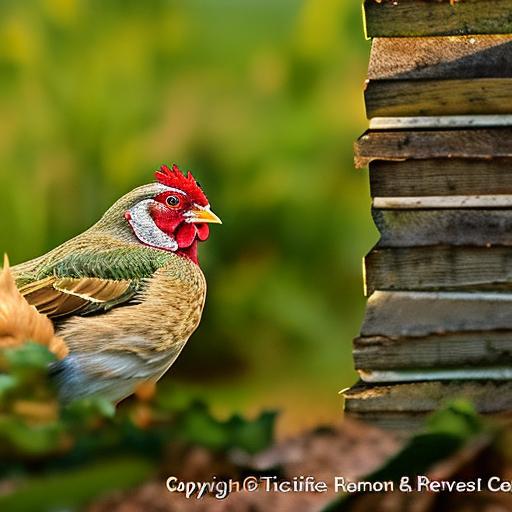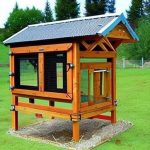Keeping chickens in your garden fallow can be a rewarding and beneficial experience. Not only do chickens provide fresh eggs, but they also offer natural pest control and can help improve the soil quality in your garden. However, before embarking on this endeavor, it is important to understand the legal requirements for keeping chickens in your area. By following these requirements and choosing the right chicken coop, you can enjoy the benefits of keeping chickens while maintaining a healthy and thriving garden.
Key Takeaways
- Keeping chickens in your garden fallow can provide numerous benefits, including fresh eggs, natural pest control, and fertilizer for your garden.
- Before starting, it’s important to research and comply with any legal requirements for keeping chickens in your area.
- Choosing the right chicken coop is crucial for the health and safety of your chickens, as well as the aesthetics of your garden.
- When building a chicken coop, consider factors such as size, ventilation, and predator protection.
- Regular maintenance of your chicken coop is essential for keeping your garden fallow clean and healthy, and raising happy and healthy chickens.
Benefits of Keeping Chickens in Your Garden Fallow
One of the main benefits of keeping chickens in your garden fallow is the abundance of fresh eggs they provide. There is nothing quite like collecting eggs from your own backyard and enjoying them for breakfast. In addition to the eggs, chickens also offer natural pest control. They love to eat insects, slugs, and other pests that can damage your plants. By allowing chickens to roam freely in your garden fallow, you can reduce the need for chemical pesticides.
Furthermore, chickens can help improve the soil quality in your garden. As they scratch and peck at the ground, they naturally aerate the soil and mix in their droppings, which are rich in nitrogen. This helps to fertilize the soil and promote healthy plant growth. Additionally, their scratching action can help break up compacted soil, allowing for better water absorption and root development.
Legal Requirements for Keeping Chickens in Your Garden Fallow
Before bringing chickens into your garden fallow, it is important to familiarize yourself with the legal requirements for keeping them in your area. These requirements may vary depending on where you live, so it is essential to research and comply with local regulations. Some common legal requirements include obtaining a permit or license, limiting the number of chickens you can keep, and ensuring that your chicken coop meets certain standards for size and cleanliness.
To find out more information about the legal requirements for keeping chickens in your area, you can contact your local government or agricultural extension office. They will be able to provide you with the necessary information and resources to ensure that you are in compliance with the law. It is important to follow these requirements to avoid any fines or penalties and to ensure the health and well-being of your chickens.
Choosing the Right Chicken Coop for Your Garden Fallow
Choosing the right chicken coop is crucial for the success of keeping chickens in your garden fallow. The coop should provide a safe and comfortable environment for your chickens, while also being practical and easy to maintain. There are several different types of chicken coops available, including traditional wooden coops, mobile coops, and converted sheds or outbuildings.
When choosing a chicken coop, consider factors such as the size of your garden fallow, the number of chickens you plan to keep, and your budget. It is important to provide enough space for each chicken to move around comfortably and to have access to nesting boxes for laying eggs. Additionally, the coop should have proper ventilation and be secure from predators.
Factors to Consider When Building a Chicken Coop for Your Garden Fallow
If you decide to build your own chicken coop for your garden fallow, there are several factors to consider. First, determine the size of the coop based on the number of chickens you plan to keep. Each chicken should have at least 4 square feet of space inside the coop and 10 square feet of outdoor space. It is also important to choose a location that is well-drained and protected from extreme weather conditions.
When building your chicken coop, safety should be a top priority. Ensure that the coop is secure from predators such as raccoons, foxes, and rats. Use sturdy materials and reinforce any weak points or potential entry points. Additionally, provide proper ventilation to prevent the buildup of moisture and ammonia from chicken droppings.
Chicken Coop Plan: Designing the Layout and Size for Your Garden Fallow

Designing the layout and size of your chicken coop is an important step in creating a functional and comfortable space for your chickens. Start by determining the number of chickens you plan to keep and calculate the required square footage based on the guidelines mentioned earlier. Consider the layout of your garden fallow and how the coop will fit into the space.
When designing the layout, think about how you will access the coop for cleaning, feeding, and collecting eggs. It is also important to provide easy access to outdoor space for your chickens to roam and forage. Consider incorporating features such as nesting boxes, roosting bars, and a secure door or gate.
To maximize space, consider using vertical space by adding shelves or ramps for your chickens to perch on. This can help create more room inside the coop while still providing enough space for each chicken. Additionally, consider using removable or adjustable features that can be easily modified as your flock grows or changes.
Materials Needed for Building a Chicken Coop for Your Garden Fallow
When building a chicken coop for your garden fallow, you will need several materials to ensure its durability and functionality. Some common materials include lumber for framing, plywood for walls and flooring, wire mesh for windows and ventilation, roofing materials, and hardware such as screws, nails, hinges, and latches.
To source affordable materials, consider checking local classified ads or online marketplaces for used or discounted building materials. You may also be able to find reclaimed or salvaged materials that can be repurposed for your chicken coop. Additionally, consider reaching out to local farms or agricultural supply stores for recommendations on where to find affordable materials.
Chicken Coop Maintenance: Keeping Your Garden Fallow Clean and Healthy
Maintaining a clean and healthy chicken coop is essential for the well-being of your chickens and the success of your garden fallow. Regular cleaning and maintenance will help prevent the buildup of waste and bacteria, reduce the risk of disease, and ensure that your chickens have a comfortable living environment.
Start by establishing a regular cleaning schedule. This may include daily tasks such as removing droppings from the coop and refreshing water and feed, as well as weekly or monthly tasks such as deep cleaning the coop and replacing bedding material. Use a safe and effective disinfectant to clean surfaces and remove any odors.
It is also important to regularly inspect the coop for any signs of damage or wear. Repair or replace any broken or weak areas to ensure the security of your chickens and to prevent predators from gaining access. Additionally, check for signs of pests such as mites or lice and take appropriate measures to eliminate them.
Tips for Raising Chickens in Your Garden Fallow
Raising chickens in your garden fallow requires proper care and attention to ensure their health and well-being. Here are some tips to help you get started:
1. Provide a balanced diet: Feed your chickens a balanced diet that includes a mix of grains, vegetables, fruits, and protein sources such as insects or mealworms. Ensure they have access to fresh water at all times.
2. Provide shelter: In addition to the chicken coop, provide sheltered areas in your garden fallow where your chickens can seek shade or protection from the elements.
3. Monitor their health: Regularly check your chickens for any signs of illness or injury. Consult a veterinarian if you notice any abnormalities or if you have concerns about their health.
4. Socialize your chickens: Chickens are social animals and thrive in groups. Introduce new chickens gradually and monitor their interactions to ensure they get along.
5. Protect against predators: Secure your chicken coop with sturdy fencing and consider using deterrents such as motion-activated lights or noise devices to deter predators.
6. Provide enrichment: Chickens are curious animals and benefit from mental and physical stimulation. Provide toys, perches, and areas for dust bathing to keep them entertained and active.
Enjoying the Rewards of Keeping Chickens in Your Garden Fallow
Keeping chickens in your garden fallow can be a rewarding and fulfilling experience. Not only do they provide fresh eggs and natural pest control, but they also help improve the soil quality in your garden. By following the legal requirements, choosing the right chicken coop, and providing proper care and maintenance, you can enjoy the benefits of keeping chickens while maintaining a healthy and thriving garden. So why not give it a try and enjoy the rewards of fresh eggs and a sustainable lifestyle?
If you’re considering keeping chickens in your garden fallow, you may also be interested in turning a shed into a chicken coop. This informative article from Poultry Wizard provides step-by-step instructions on how to transform a shed into a comfortable and functional space for your feathered friends. From choosing the right shed to installing ventilation and nesting boxes, this guide covers everything you need to know to create a cozy home for your chickens. Check out the article here for all the details.
FAQs
Can I keep chickens in my garden fallow?
Yes, you can keep chickens in your garden fallow. However, there are certain things you need to consider before doing so.
What are the things I need to consider before keeping chickens in my garden fallow?
You need to consider the size of your garden, the number of chickens you want to keep, the type of chickens you want to keep, the local zoning laws, and the availability of food and water for the chickens.
What is the ideal size of a garden for keeping chickens?
The ideal size of a garden for keeping chickens depends on the number of chickens you want to keep. Generally, you need at least 2-3 square feet of space per chicken.
What type of chickens are best for keeping in a garden fallow?
The best type of chickens for keeping in a garden fallow are those that are good foragers and can adapt to different environments. Some of the best breeds for backyard chicken keeping include Rhode Island Reds, Plymouth Rocks, and Leghorns.
What are the local zoning laws regarding keeping chickens in a garden fallow?
The local zoning laws regarding keeping chickens in a garden fallow vary from place to place. Some areas allow backyard chicken keeping, while others do not. It is important to check with your local authorities before keeping chickens in your garden fallow.
What do chickens eat and drink?
Chickens eat a variety of foods, including grains, vegetables, fruits, and insects. They also need access to clean water at all times.
What are the benefits of keeping chickens in a garden fallow?
Keeping chickens in a garden fallow can provide a source of fresh eggs, natural pest control, and fertilizer for your garden. Chickens also make great pets and can be a fun addition to your backyard.
Meet Walter, the feathered-friend fanatic of Florida! Nestled in the sunshine state, Walter struts through life with his feathered companions, clucking his way to happiness. With a coop that’s fancier than a five-star hotel, he’s the Don Juan of the chicken world. When he’s not teaching his hens to do the cha-cha, you’ll find him in a heated debate with his prized rooster, Sir Clucks-a-Lot. Walter’s poultry passion is no yolk; he’s the sunny-side-up guy you never knew you needed in your flock of friends!







